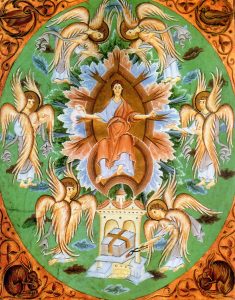Arkiv, Høytlesning
Desert Fathers 17
Abba Peter said: ‘I questioned [Abba Isaiah] saying, “What is the fear of God?” He said to me: “A man who puts his trust in that which is not God, such a man has not the fear of God in him”’.
What is ‘the fear of God’? It may seem a contradiction in terms. Are true believers not supposed to be fearless? Does not perfect love cast out fear? Fear is a humiliating sentiment. We associate it with the trembling of a cornered dormouse before a fat cat. Is that an appropriate spiritual attitude for people having put their trust in God?
Of course not. The fear of God stands for something else, not a nervous anxiety, but an existential consciousness of reverence. Fear of God stands for the natural response of a creature, a thing made out of nothing, faced with divine, uncreated Being. In Scripture we find instances of such fear reverently expressed, for example in the fifth chapter of Isaiah. It recounts a vision the prophet entertained in the year King Uzziah died, so in the mid-eighth century BC, a period of trial for the peoples of Judah and Israel, brother-nations tragically divided, locked in rivalry. Most people’s minds were on transactional matters concerned with national security. Isaiah meanwhile was confronted with the overwhelming reality of God, summoned to recall his brethren to a sense of proportion and to re-establish the principles by which God’s people was to live. Here is how Isaiah describes what he saw:
I saw the Lord sitting upon a throne, high and lifted up; and his train filled the temple. Above him stood the seraphim; each had six wings: with two he covered his face, and with two he covered his feet, and with two he flew. And one called to another and said: ‘Holy, holy, holy is the Lord of hosts; the whole earth is full of his glory.’ And the foundations of the thresholds shook at the voice of him who called, and the house was filled with smoke. And I said: ‘Woe is me! For I am lost; for I am a man of unclean lips, and I dwell in the midst of a people of unclean lips; for my eyes have seen the King, the Lord of hosts!’
On the face of it, Isaiah’s experience would seem desirable. Who does not yearn to see God, the beatitude pledged to the pure of heart? Such vision is traumatic, however, when our heart is not pure. The confrontation with God’s glory, which the Bible likens to fire of unparalleled intensity, will burn away that in us which is not of God, which is incompatible with the presence of the Holy One attended by seraphs whose name means ‘burning’, whose being is fire, configured to sustain divine truth.
The image of gold refined by fire is used several times in the Bible to describe the trajectory of faith. Zechariah, two centuries after Isaiah, spoke of God’s putting Israel’s remnant into fire to ‘refine them as one refines silver, to test them as gold is tested’. Experientially, such refinement is traumatic. It means letting go of all claims to self-reliance as I stand before God stripped of anything but essentials, conscious of contingency, having nothing of my own to lean on, neither wealth nor degrees nor acquaintances nor accomplishments. No wonder we run a mile from this kind of testing, preferring to rest instead in our own illusions of significance, however brittle.
Abba Peter’s criterion of discernment, therefore, remains relevant. He answers the simple question put to him, ‘What is the fear of God?’, not by proffering a tidy definition but by setting in motion instead a process of self-examination. He asks: ‘Do you in fact trust God?’ People of faith easily assume that they place their trust in God. It is one thing, though, to stand in church on a Sunday and recite the creed; it is another to confront circumstances that threaten to turn our existence upside-down.
Do I trust God when confronted with illness, the loss of a job, betrayal in marriage or friendship? Do I trust God in the face of strategic and environmental menace?
To show trust in hardship and in situations of risk is not tantamount to being fatalist; it is not about leaning back thumb-twiddlingly, expecting God to just sort everything out. Things do not always get sorted out; illness is not always healed; sometimes fractured relationships cannot be mended. To trust God is not to assume that I will be alright. It is to know that, whatever happens, sense may emerge from senselessness, redemptive purity from destructive contamination.
We make progress on this path when we come to appreciate how utterly other God is. For being, in Christ, Emmanuel, God-with-us, God remains utterly beyond our notions. His thoughts are not our thoughts, his ways not our ways. There will be times when all we can do is, Job-like, to bow down deep and adore uncomprehending. A thousand years in our counting are but a day before God. Sometimes the purposefulness of present hardship takes time to be revealed. Sensing God’s greatness, we learn to revere him in a healthy way, astonished that such Majesty should, for love, have come so close to us in the incarnation, drawing forth our love, which in turn casts out for good all undue anxiety. To balance childlike trust with reverent worship, knowing that underneath all life’s vicissitudes are the everlasting arms: this is what it means to know the tremendous fear of God, which at once pierces and heals human hearts.
Miniature depicting the prophet Isaiah’s vision of God and decorative initial page showing the cleansing of the prophet, from an Isaias glossatus made in Reichenau, Germany, ca. 1000. Staatsbibliothek Bamberg, Msc.Bibl.76, fols. 10v–11r.

